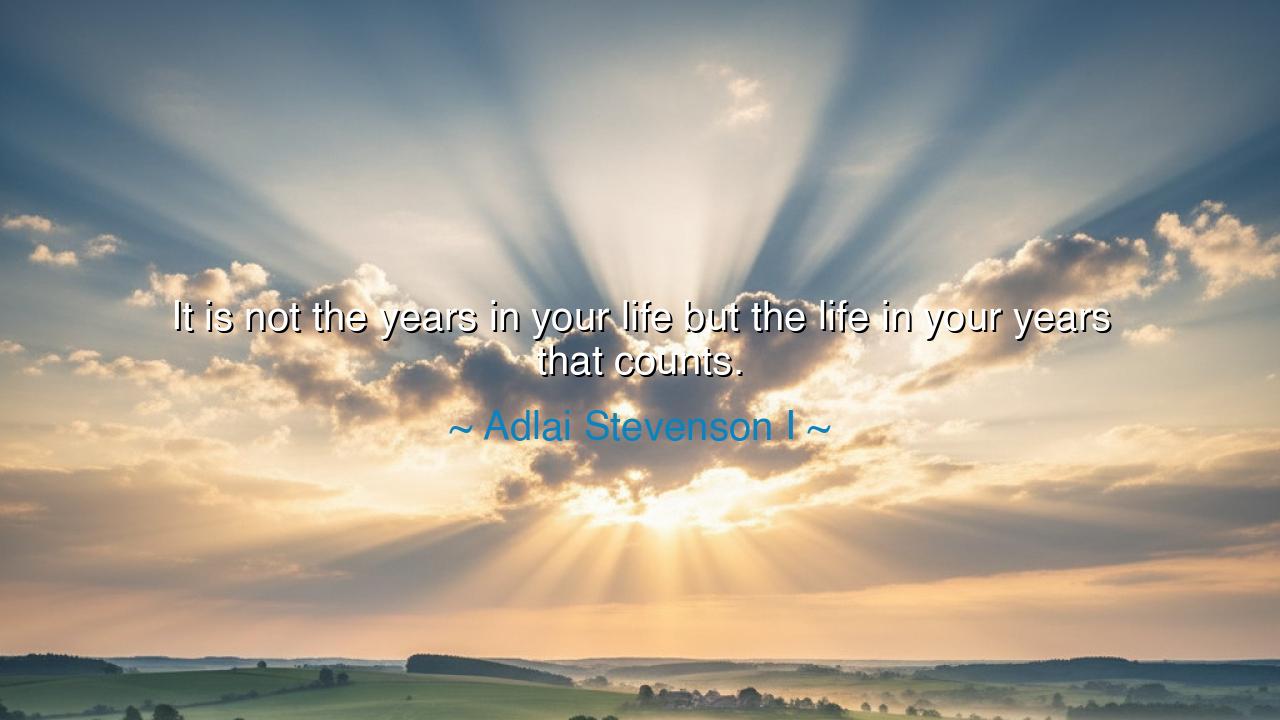
It is not the years in your life but the life in your years that






The words of Adlai Stevenson I—“It is not the years in your life but the life in your years that counts.”—strike like a bell tolling in the stillness of time. They remind us that existence is not measured by the ticking of the clock, nor by the length of one’s days, but by the depth, richness, and meaning one pours into them. A man may live a century and yet leave behind no echo, while another may walk but a few decades and shake the earth with the fire of his spirit. Life, Stevenson teaches, is not about duration, but about fullness.
The origin of this quote belongs to Stevenson, a statesman of the nineteenth century, who understood both the brevity and the grandeur of human life. Living in an age of hardship, civil conflict, and transformation, he saw that mortality was not an enemy to fear but a boundary that gave urgency to existence. His words reflect a truth recognized by the ancients and repeated by the wise: that the value of a life is found not in how long it endures, but in how nobly it is lived.
Consider the story of Alexander the Great. He died at only thirty-two, yet in his short span he conquered empires, spread culture, and altered the course of civilizations. His life was brief, yet it burned like a star, casting light far beyond its years. In contrast, there are many who have lived long but left little behind but dust. Stevenson’s words remind us that the life in your years—the courage, the love, the deeds, the wisdom—is the true measure of existence.
The ancients, too, cherished this truth. The Stoic philosopher Seneca wrote, “It is not that we have a short time to live, but that we waste a lot of it.” He, like Stevenson, saw that men squander years in trivialities, as though longevity were enough. But the wise man knows that each day is a jewel, and that meaning comes not from the number of jewels, but from their brilliance. One day of kindness may outweigh ten years of selfishness; one act of courage may live longer in memory than a lifetime of comfort.
This teaching also calls us to action. To live well is not to wait for the years to pile up like stones, but to breathe vitality into each moment. To love fully, to work with purpose, to serve with humility, to create, to learn, to grow—these are the things that put life into your years. Without them, the years are hollow shells. With them, even a short life becomes immortal, echoing through the hearts of those who come after.
History gives us another radiant example in Anne Frank, who lived but fifteen short years before her life was cut off by hatred. Yet her diary, filled with honesty, courage, and hope, continues to inspire millions. Though her years were few, the life within them was immeasurable, shining brighter than countless lives that pass forgotten. Here we see Stevenson’s truth: fullness, not length, is what endures.
The lesson for us is clear: do not waste your days waiting for “someday,” nor envy those who seem to live longer. Instead, ask yourself each day: how much life can I pour into these hours? Am I living fully, or merely existing? Choose to live with intention—cherish your loved ones, pursue what is noble, give freely, and seek wisdom. For the years will pass regardless, but the life you put into them is your offering to eternity.
Thus, Stevenson’s words are a call to live fiercely, to embrace the present with courage and joy. It is not the years in your life but the life in your years that counts. Let us then not chase after longevity alone, but after meaning, for in living well, even a short life can blaze like a beacon through the ages. And those who follow will remember not how long we lived, but how deeply, how bravely, and how truly.






AAdministratorAdministrator
Welcome, honored guests. Please leave a comment, we will respond soon